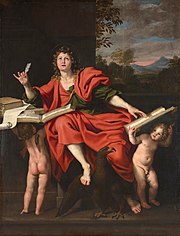

| Part of a series of articles on |
| John in the Bible |
|---|

|
| Johannine literature |
|
|
| Authorship |
|
|
| Related literature |
|
|
| See also |
|
|
|
|
Johannine literature is the collection of New Testament works that are traditionally attributed to John the Apostle, John the Evangelist, or to the Johannine community.[1] They are usually dated to the period c. AD 60–110, with a minority of scholars, including Anglican bishop John Robinson, offering the earliest of these datings.

Johannine literature is traditionally considered to include the following works:[2]
Of these five books, the only one that explicitly identifies its author as a "John" (Ancient Greek: Ἰωάννης, romanized: Iōannēs) is Revelation. Modern scholarship generally rejects the idea that this work is written by the same author as the other four documents.[3] The gospel identifies its author as the disciple whom Jesus loved, commonly identified with John the Evangelist since the end of the first century.[4]
Scholars have debated the authorship of Johannine literature (the Gospel of John, Epistles of John, and the Book of Revelation) since at least the third century, but especially since the Enlightenment. The authorship by John the Apostle is rejected by many modern scholars.[5][6]
Although ancient traditions attributed to the Apostle John the Fourth Gospel, the Book of Revelation, and the three Epistles of John, modern scholars believe that he wrote none of them.
|
| |||||
|---|---|---|---|---|---|
| Bible (New Testament) |
| ||||
| Events (chronological) |
| ||||
| Phrases |
| ||||
| People |
| ||||
| Places |
| ||||
| "I AM" sayings |
| ||||
| Related |
| ||||
| Adaptations |
| ||||
| Manuscripts |
| ||||
| Sources |
| ||||